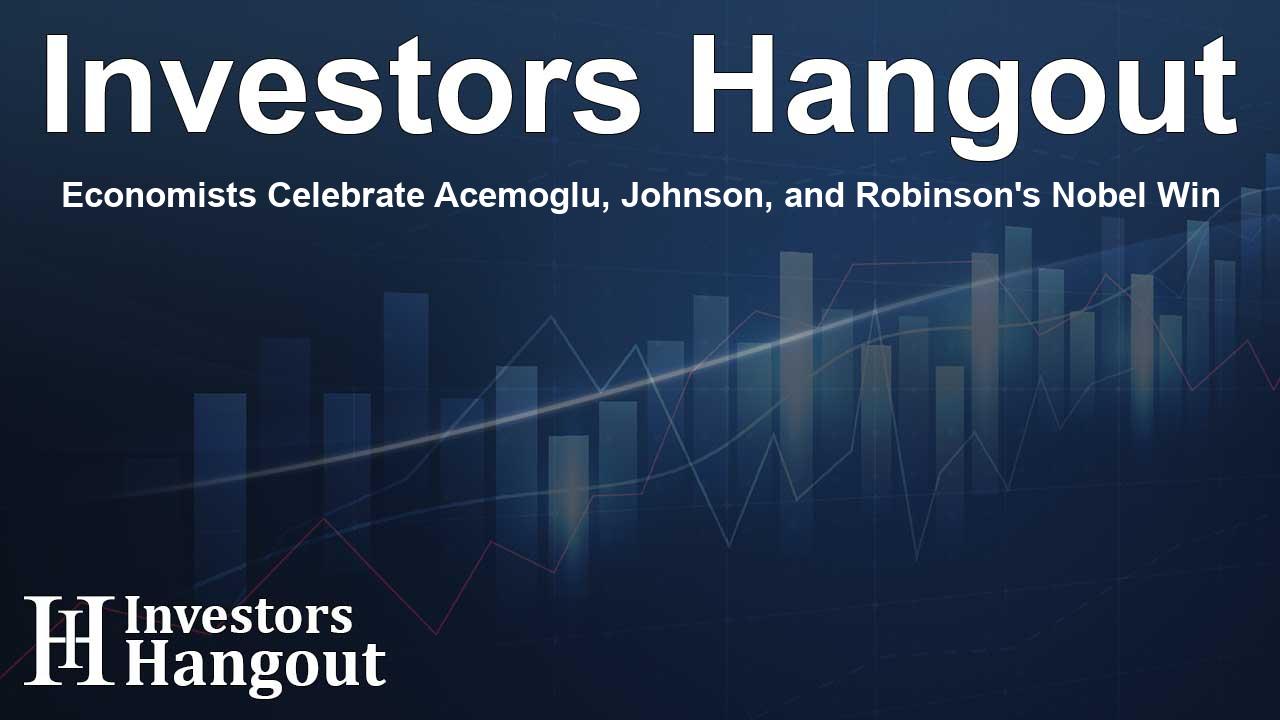Economists Celebrate Acemoglu, Johnson, and Robinson's Nobel Win

Acclaimed Economists Acknowledge Nobel Laureates
In a resounding applause for the winners of the Nobel Prize in Economic Sciences, distinguished economists are celebrating the achievements of Daron Acemoglu, Simon Johnson, and James Robinson. Their influential research on global wealth inequality and the effects of institutions on economic development has garnered recognition and respect from the economic community.
Insights from Gita Gopinath
Gita Gopinath, the Deputy Managing Director at the International Monetary Fund, shared her heartfelt congratulations via social media. She highlighted the critical role that sound institutions play in a nation's prosperity, emphasizing the valuable contributions of Acemoglu, Johnson, and Robinson.
Understanding the Importance of Good Institutions
Gopinath's remarks reflect a broader understanding among policymakers regarding the foundations of economic success. She noted, "Good institutions are critical to a country’s prosperity," underlining how essential these frameworks are for sustainable development.
Paul Krugman's Perspective
Nobel laureate Paul Krugman also weighed in on the significance of the trio’s work. On social media, he commended their research on the long-lasting impacts of colonial resource extraction. Krugman’s recognition highlights the lasting relevance of their findings in today’s discussions around wealth disparities.
Colonial Regimes and Economic Impact
Krugman pointed out that understanding the historical context of economic structures is vital. His note on how colonial regimes focused on resource exploitation offers critical insights into the persistent issues faced by many economies today.
Jason Furman's Reflection on Empiricism
Jason Furman, a prominent economic advisor from the Obama administration, provided an in-depth analysis of the award’s significance. He expressed gratitude for the winners’ work in illuminating pressing economic questions, particularly the stark contrasts in wealth among nations.
Empirical Approaches vs. Theoretical Models
Furman contrasted the empirical methodology of the laureates with earlier economic theories. He explained that while traditional models offered some insights, Acemoglu, Johnson, and Robinson's empirical approaches build upon these ideas, leading to a more robust understanding of economic growth.
Dani Rodrik's Praise for Institutional Studies
Dani Rodrik from Harvard praised the laureates for revitalizing the study of institutions within the realm of mainstream economics. His assertion that they have made this field exciting again speaks volumes about the impact of their research on contemporary economic thought.
Stimulating Intellectual Engagement
Rodrik remarked that their work has generated extensive literature and research, demonstrating a renewed interest and engagement in the field. The thriving discourse surrounding institutions and their role in economic development has significant implications for policymakers and economists alike.
Understanding the Nobel Committee's Decision
The Nobel Committee's recognition of these U.S.-based economists underscores their groundbreaking findings on how inadequate legal frameworks and exploitative institutions hinder economic progress. The lasting contributions of Acemoglu and Johnson, both from the Massachusetts Institute of Technology, along with Robinson from the University of Chicago, mark a significant milestone in economic research.
The Broader Context of Nobel Recognitions
The honor bestowed upon Acemoglu, Johnson, and Robinson aligns with this year's trend of recognizing vital academic contributions in various fields. Earlier, the Nobel Prize in Physics was awarded to Geoffrey Hinton and John Hopfield for their foundational work in artificial intelligence, indicating a breadth of innovation and the interconnectedness of different disciplinary advancements.
Frequently Asked Questions
What was awarded to Acemoglu, Johnson, and Robinson?
They were awarded the Nobel Prize in Economic Sciences for their research on global wealth inequality and the impact of institutions on economic development.
Why are institutions important in economics?
Institutions shape the rules and frameworks that govern economic activity, critical for promoting prosperity and addressing wealth disparities.
Who are some notable economists discussing the winners?
Prominent economists such as Gita Gopinath, Paul Krugman, and Dani Rodrik have publicly celebrated the laureates’ achievements and their importance.
What impact does this prize have on economic discourse?
This award stimulates discussions on the relevance of institutional economics and how it can address ongoing global economic challenges.
What is the relevance of their work today?
Their research continues to inform policymakers about the necessity of solid institutions in fostering economic growth and stability.
About Investors Hangout
Investors Hangout is a leading online stock forum for financial discussion and learning, offering a wide range of free tools and resources. It draws in traders of all levels, who exchange market knowledge, investigate trading tactics, and keep an eye on industry developments in real time. Featuring financial articles, stock message boards, quotes, charts, company profiles, and live news updates. Through cooperative learning and a wealth of informational resources, it helps users from novices creating their first portfolios to experts honing their techniques. Join Investors Hangout today: https://investorshangout.com/
Disclaimer: The content of this article is solely for general informational purposes only; it does not represent legal, financial, or investment advice. Investors Hangout does not offer financial advice; the author is not a licensed financial advisor. Consult a qualified advisor before making any financial or investment decisions based on this article. The author's interpretation of publicly available data shapes the opinions presented here; as a result, they should not be taken as advice to purchase, sell, or hold any securities mentioned or any other investments. The author does not guarantee the accuracy, completeness, or timeliness of any material, providing it "as is." Information and market conditions may change; past performance is not indicative of future outcomes. If any of the material offered here is inaccurate, please contact us for corrections.